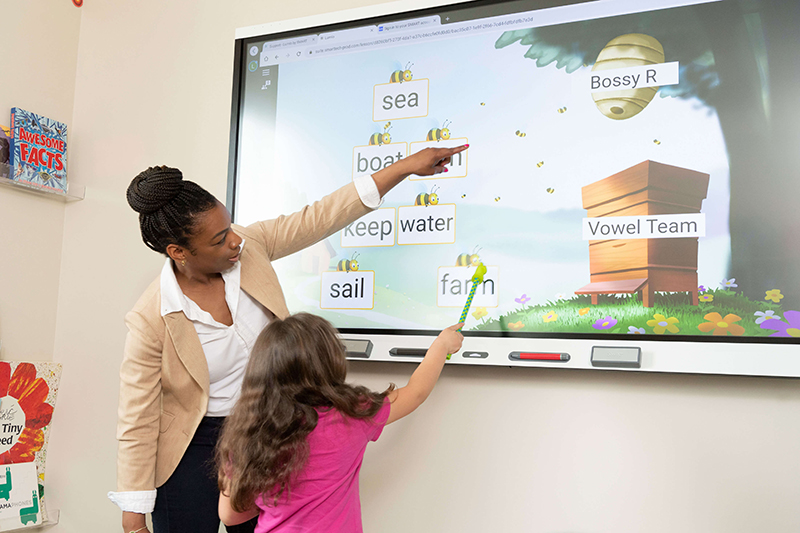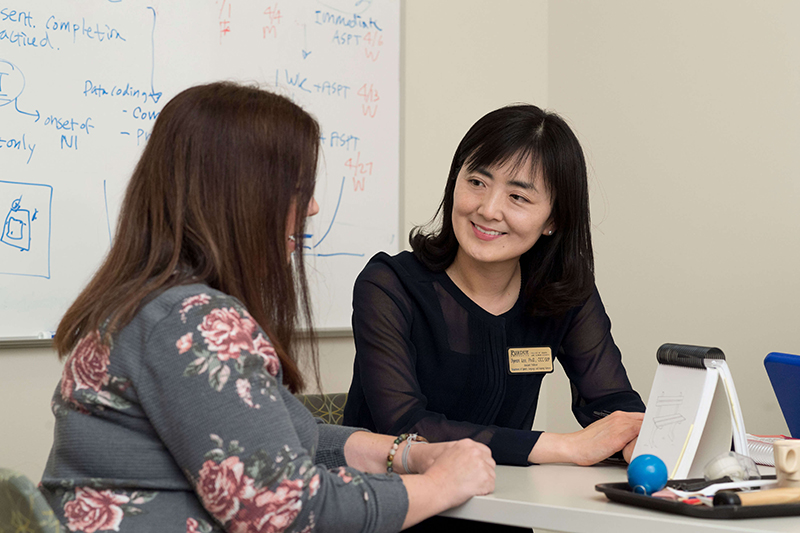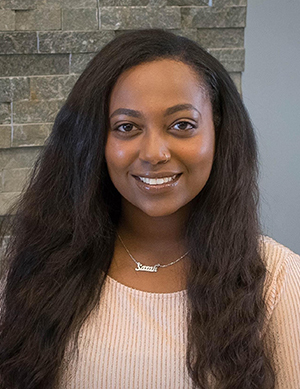March 20, 2023
No. 3 speech-language pathology graduate program in HHS advances well-being in communication, swallowing

Chenell Loudermill, clinical professor and director of clinical education in the speech-language pathology program, helps children build literacy skills and works with those who have autism spectrum disorder — two of the many challenges explored in the No. 3-ranked program. (Purdue University photo/John Underwood)
About this series: This story is part of an ongoing Purdue Today series highlighting programs ranked in the Top 10 or Top 10th percentile among our peers nationally, demonstrating the university’s persistent pursuit of excellence, innovation and transformative learning.
An individual who suffered from a stroke finds themself struggling to swallow. Speaking and writing escape an older adult with mild cognitive impairment. Parents are concerned because their child is having trouble learning words or playing meaningfully with friends. A person with autism spectrum disorder wishes to improve social interactions with those around them.
These are among the many daily challenges addressed by speech-language pathologists who got their start in the Department of Speech, Language, and Hearing Sciences at Purdue University. Within the department, the No. 3 nationally ranked speech-language pathology graduate program prepares these clinicians to provide solutions to a broad range of communication and swallowing disorders that have major effects on individuals’ health and well-being.
 Associate professor Jiyeon Lee explores how aphasia affects a person’s ability to produce and comprehend speech in one of the 22 speech-language pathology clinical programs. (Purdue University photo/John Underwood)
Download image
Associate professor Jiyeon Lee explores how aphasia affects a person’s ability to produce and comprehend speech in one of the 22 speech-language pathology clinical programs. (Purdue University photo/John Underwood)
Download image
“The speech-language pathology program’s exceptionally high ranking is a reflection of the dedication of our expert faculty as they ready our students to take giant leaps in diagnosing and treating speech, language, voice and swallowing disorders across the life span,” says Preeti Sivasankar, SLHS professor and department head. “Through high-quality clinical experiences, challenging coursework and cutting-edge research opportunities, we are preparing clinicians who will make a difference every day in the lives of patients around the world.”
The five-semester clinical master’s program housed within the College of Health and Human Sciences offers students abundant experiential learning opportunities.
Working alongside clinical faculty in the department’s 22 speech, language, voice and swallowing clinical programs, students learn to help with everything from gender-affirming care and literacy to dysphagia, or difficulty swallowing. Within the program, students also have opportunities to explore research that makes significant contributions to the field, allowing them to understand the science behind their clinical techniques.
“As one of the top programs of its kind in the nation, our outstanding speech-language pathology program shapes future clinicians to provide the vitally important care to help individuals optimize their health and well-being and live their best lives,” says Marion K. Underwood, HHS dean and distinguished professor of psychological sciences. “The excellence of the program’s faculty and staff have helped guide the program to national recognition.”
Sarah Robso, a 2022 alumna of the speech-language pathology program, now works at the Educational Service Center of Central Ohio. She is assisting children ages 5-18 in the school setting who primarily have developmental language disorder, autism, or they are learning to communicate with augmentative and alternative communication (AAC) devices.
 Sarah Robso
Sarah Robso
She notes the breadth of clinical opportunities within its M.D. Steer clinics on campus. And the welcoming nature of the department helped make her graduate school experience distinct.
“The clinical opportunities here compared to other universities are great,” Robso says. “We get experiences in almost every area of speech-language pathology. The clinical faculty are also very humble, kind and welcoming. They truly treat us as soon-to-be colleagues.”
One of Robso’s clinical experiences was her evidence-based practice project, which focused on augmentative and alternative communication for children on the autism spectrum. For her, the balance between support and autonomy from the program’s faculty mentors prepared her to take her next giant leap into the workforce.
“I had a lot of support with the initial learning, and then the supervisors do a great job of slowly increasing our independence as we get closer to graduating,” Robso says. “They really do a great job of preparing us for the real world.”
Writer: Rebecca Hoffa, rhoffa@purdue.edu

